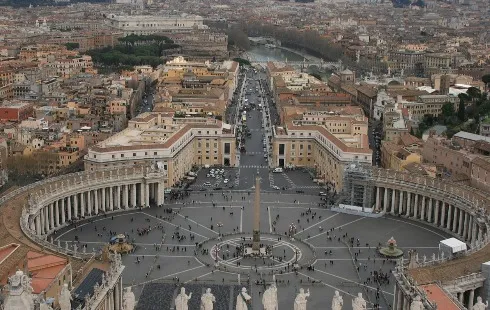
Inside the Conclave: 10 Fascinating Facts About the Secretive Process to Elect a New Pope
Section: Politics
In the picturesque town of Agnone, nestled within Italy's southern Apennines, the age-old craft of bell-making continues to thrive. With a rich history dating back to the Middle Ages, this quaint location is renowned for its exceptional bronze bells, manufactured by the Marinelli family for generations. The bells are sought after worldwide, and the meticulous production process embodies a philosophy of patience and artistry.
The chill of early April hangs in the air as residents of Agnone, a town with a population of around 5,000, bundle up against the cold. Nearby, signs promote winter sports in the neighboring municipality of Capracotta, contrasting with Agnone's serene rural landscape. Located approximately 150 kilometers from both Naples and Rome, Agnone is a hidden gem in the Molise region, characterized by its lush greenery, absence of highways, and minimal industrial activity.
The local economy thrives on artisanal products, including the famous Caciocavallo cheese and a variety of traditional sausages. However, it is the Marinelli bell foundry that draws visitors to Agnone, with an annual influx of 30,000 to 40,000 tourists eager to witness the craftsmanship that has made this family name synonymous with quality bell-making.
Daniele Saia, the town's mayor, highlights the foundry as Agnone's "calling card." The Marinelli family has been granted the privilege of using the papal coat of arms since 1924, a testament to their esteemed reputation. Today, the family continues to produce bells using techniques that have remained unchanged for centuries, often referred to as "craft intelligence" in a world increasingly dominated by artificial processes.
Visitors to the foundry are greeted by the sight of various-sized bells, each a product of time-honored traditions. Despite the advancements in industrial manufacturing, the Marinelli family maintains a commitment to their historical methods, prioritizing quality over efficiency. The foundry's environment exudes a sense of nostalgia, with the aroma of fire and earth permeating the air, reminiscent of Friedrich Schiller's poetic descriptions of bell-making.
The process of creating a bell is intricate and time-consuming, often taking three to four months from conception to completion. As the molten bronze is poured into clay molds--an act that requires a prayer to the Virgin Mary for good fortune--the artisans acknowledge their lack of control over the final product. Each bell embodies the hopes and aspirations of its makers, who share a deep emotional connection to their craft.
Among the artisans is Pasquale Marinelli, a robust figure embodying the spirit of the foundry. Alongside him works his nephew Ettore, who contributes artistic flair to the bells through intricate designs and embellishments, drawing inspiration from centuries of family heritage. The foundry is replete with a treasure trove of molds and models that showcase the artistic evolution of bell-making through the ages.
Despite its historical roots, the Marinelli foundry operates in a global context, with bells shipped to locations as diverse as the Vatican, Peking, and the United Nations headquarters in New York City. In a modern twist, the company has even developed an app that allows for remote activation of bell chimes, bridging the gap between traditional craftsmanship and contemporary technology.
As Agnone grapples with a declining population--roughly half the number of residents compared to the 1950s--local leaders hope that the unique lifestyle and slower pace of life will attract retirees seeking a tranquil existence away from urban chaos. The philosophy of "slow living," which emphasizes harmony with nature and cultural heritage, is gaining traction in regions like Molise, offering a potential solution to counteract depopulation.
While the foundry represents a slower, more contemplative approach to craftsmanship, the nearby city of Isernia showcases a different reality, where modern industry thrives. The juxtaposition of these two worlds raises questions about the future of the region: will it lean towards the artisanal, or embrace the fast pace of contemporary manufacturing?

Section: Politics

Section: Health

Section: Health

Section: Politics

Section: Business

Section: Science

Section: Politics

Section: News

Section: News

Section: Politics

Health Insurance in Germany is compulsory and sometimes complicated, not to mention expensive. As an expat, you are required to navigate this landscape within weeks of arriving, so check our FAQ on PKV. For our guide on resources and access to agents who can give you a competitive quote, try our PKV Cost comparison tool.

Germany is famous for its medical expertise and extensive number of hospitals and clinics. See this comprehensive directory of hospitals and clinics across the country, complete with links to their websites, addresses, contact info, and specializations/services.

Join us for an exciting theatrical experience on Saturday, May 10, 2025, from 19:30 to 22:00 at the Münchner Kammerspiele - Werkraum. This performance, directed by Melina Dressler, is a directorial exercise inspired by Heiner Müller's 'Quartett' and incorporates texts by Michel Foucault. The...
No comments yet. Be the first to comment!